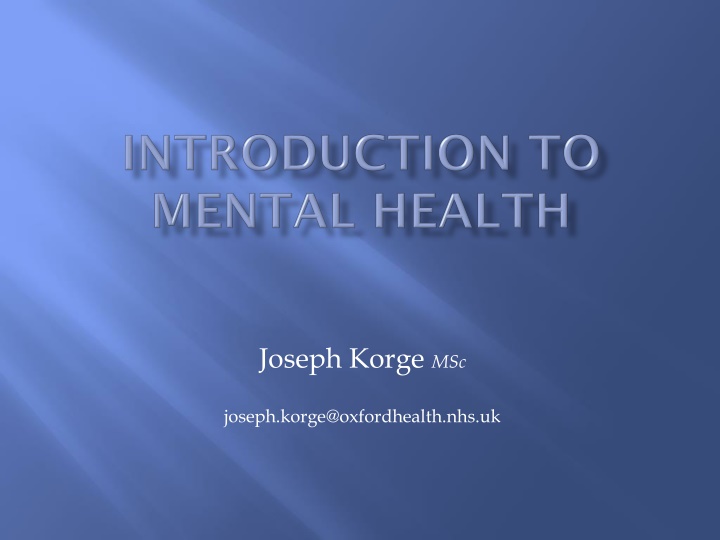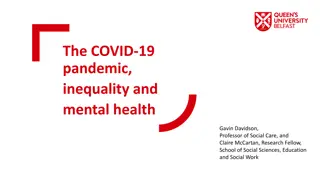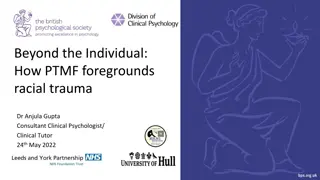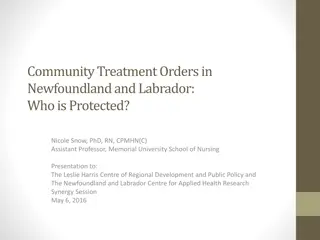Insights into Mental Health Issues
Mental health is a crucial aspect of overall well-being, impacting various areas of life such as productivity, coping abilities, and societal norms. The prevalence of mental illness globally underscores the need for awareness and support. From conditions like depression, anxiety, to episodes of mood instability, understanding the nuances of these disorders is essential for effective treatment and support. Cultural factors also play a significant role in how mental health issues are perceived and addressed in different populations. Exploring these complexities sheds light on the importance of psychological well-being and the necessity of removing stigmas associated with mental disorders.
Download Presentation

Please find below an Image/Link to download the presentation.
The content on the website is provided AS IS for your information and personal use only. It may not be sold, licensed, or shared on other websites without obtaining consent from the author.If you encounter any issues during the download, it is possible that the publisher has removed the file from their server.
You are allowed to download the files provided on this website for personal or commercial use, subject to the condition that they are used lawfully. All files are the property of their respective owners.
The content on the website is provided AS IS for your information and personal use only. It may not be sold, licensed, or shared on other websites without obtaining consent from the author.
E N D
Presentation Transcript
Joseph Korge MSc joseph.korge@oxfordhealth.nhs.uk
Psychological well being Ability to enjoy life Mental performance Productivity Societal norms Consistency mood, behaviour, functioning. Level of function Ability to cope Behavioural adjustment Circumstantial Joseph Korge
Mental illness is one of the main causes of disease burden worldwide (1). 1 in 6 in the last week, 1 in 4 in the last year (2). UK cost = 100bn per year (3). 30% people with chronic physical illness (3). 6,233 suicides recorded in the UK in 2013 (3). Prevalence =relevance. Joseph Korge
Depression Anxiety Bipolar disorder Schizophrenia Bipolar-affective disorder Schizo-affective disorder Personality disorders Eating disorders Addiction PTSD OCD Joseph Korge
Episodes of depression and elation Mood instability 1% of population(3). Type I, Type II, Rapid Cycling, Cyclothymia. Joseph Korge
Constant sadness Loss of appetite Anhedonia Nihilism Low self-esteem Isolation Poor sleep and self care Avoiding eye contact Suicidality Very happy Flight of ideas Full of energy Over exercising Reckless spending Disinhibition Grandiosity Frustrated with others who aren t as happy Joseph Korge
Abnormal social behaviour Inability to understand what is real Hallucinations False beliefs 0.3-0.7% prevalence Risk factors include genetics, being male, cannabis use, older parents, being raised in a city. Culture must be considered Paranoia Split Personality https://www.youtube.com/wat ch?v=SN1GCoVzxGg Joseph Korge
Incidence of SCZ in black African and Caribbean population much higher than white population in UK (9) Nine times more likely (10) Differences in culture? Trend has continued with second and third generation migrants. Many African religions include spiritual beliefs Shamanism ability to connect with supernatural realm, an aspect of many religions. Ireland delusions of sainthood Industrialised countries delusions of surveillance Cultural/societal norms who can diagnose? Joseph Korge
1st-20th Century Asylums, mad houses, workhouses. Religion Abandonment Abuse and restraint Confinement Untrained staff 5000BC Skull trephination Lobotomies Exorcisms Isolation Ancient Greece Biomedical model Blood letting Purging Imposing balanced diets Environmental change Occupational change Joseph Korge
Medication Antidepressants Antipsychotics Mood Stabilisers Anxiolytics Talking Therapy CBT Mindfulness Psychotherapy Psychology Social Care Community support Financial support Housing Acute Hospital Care Controlled environment Medication trials MDT Identification of needs Assessment of risks Episodes of increased illness severity Electro-convulsive Therapy Electrical current into the brain - seizure Treatment resistant depression Psychotic depression Catatonia - SCZ Informed consent Safe environment Community Teams Dedicated Care Co- ordinator Multi-disciplinary Assistance with occupation Social inclusion schemes Point of contact for all care needs Medication issues Joseph Korge
Nausea Indigestion Constipation Diarrhoea - Ache Agitation Insomnia Anxiety Sexual Dysfunction Stiffness Restlessness Sleepiness Tardive Dyskinesia Weight Gain Slowness Increased Thirst Urinary Frequency Muscle Weakness Shaking Drooling Dry Skin Headaches Sweating Goitre Feinting Bradycardia Bradykinesia Increased Appetite Confusion Memory Loss Tinnitus Visual Disturbance Ataxia Skin Rashes Itchiness Hair Loss Fluid Retention Reduced WBC Chills Fever Anhedonia Joseph Korge
4.1 times the overall risk of premature death (4) Dying up to 20 years too early (5) Twice the risk of diabetes (6) 3 times the risk of hypertension (7) 10 fold increase in deaths from respiratory disease (7) Physical disease is under-diagnosed and under treated in people with schizophrenia (8) Joseph Korge
30% stroke patients suffer depression (11) Long term physical morbidity = 3 times more likely to have MH problems than population (12) Major depression 4 times greater in people with chronic LBP (13) Gulliver et al. 2015 half of elite athletes suffering symptoms of mental ill health (14) Fipro study 2015 38% professional footballers suffering with depression (13% in gen pop) (15) Joseph Korge
Emotions, experience, perceptions. fMRI studies same regions activated with pain DeWall et al 2010 paracetamol reduces psychological pain/hurt (16) Demonstrating substantial overlap between physical and psychological pain. Joseph Korge
Humans are incredibly complex creatures Mental illness is common Even more common with physical morbidity Linked to poor physical health and early death You will have mentally unwell patients in every specialty of physiotherapy Therefore: Every physiotherapist should understand: 1. Symptoms of mental illness 2. Treatments for mental illness side effects 3. Impact of mental illness on physiotherapy Rx Joseph Korge
Vos, T., et al. (2013) Global, regional, and national incidence, prevalence, and years lived with disability for 301 acute and chronic diseases and injuries in 188 countries, 1990 2013: a systematic analysis for the Global Burden of Disease Study. The Lancet. 386 (9995). pp. 743-800. McManus S, Bebbington P, Jenkins R, Brugha T. (eds.) (2016) Mental health and wellbeing in England: Adult Psychiatric Morbidity Survey 2014. Leeds: NHS Digital. Available . Metalhealth.org.uk (2015) Newman SC, Bland RC. (1991). Mortality in a cohort of patients with schizophrenia: a record linkage study. Can J Psychiatry 36, pp 239 45. Brown S, Kim M, Mitchell C and Inskip H., (2010). Twenty-five year mortality of a community cohort with schizophrenia. British Journal of Psychiatry 196 pp 116 21. Royal College of Psychiatrists, 2013 Whole person care: from rhetoric to reality. Achieving parity between mental and physical health , Occasional paper OP88. Mental health and smoking: a position statement (2008), Faculty of Public Health. Smith DJ, Langan J, McLean G, et al Schizophrenia is associated with excess multiple physical-health comorbidities but low levels of recorded cardiovascular disease in primary care: cross-sectional study. BMJ Open 2013;3:e002808. doi: 10.1136/bmjopen-2013-002808 Pinto R, Ashworth M, Jones R. Schizophrenia in black Caribbeans living in the UK: an exploration of underlying causes of the high incidence rate. The British Journal of General Practice. 2008;58(551):429-434. doi:10.3399/bjgp08X299254. Fearon P, Kirkbride J, Morgan C, et al. Incidence of schizophrenia and other psychoses in ethnic minority groups: results from the MRC SOP Study. Psychol Med. 2006;36(11):1541 1550 Paolucci S. Epidemiology and treatment of post-stroke depression. Neuropsychiatric Disease and Treatment. 2008;4(1):145-154. Naylor, C. (et al) The King s Fund: Long Term Conditions and Mental Health (2012). Available online. Sullivan, M. J., (et al) The treatment of depression in chronic low back pain. Pain (1992). Available online. Gulliver, A., Griffiths, K. M., Mackinnon, A., Batterham, P. J., and Stanimirovic, R. (2015). The mental health of Australian elite athletes. J. Sci. Med. Sport 18, 255 261. Guardian UK 2015, report on Fipro study. Available at: https://www.theguardian.com/football/2015/oct/06/depression-professional- football-fifpro-survey DeWall, N. C., et al. Acetaminophen Reduces Social Pain. Psychological Science (2010). Available Online. 1. 2. 3. 4. 5. 6. 7. 8. 9. 10. 11. 12. 13. 14. 15. 16. Joseph Korge























